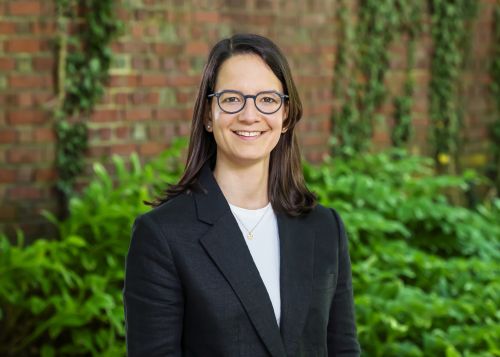
Alison Ferris. Photo by David Kelly Crow
By Alaina O'Regan
September 18, 2024
Alison Ferris, an expert in low-carbon fuels, has joined Princeton University as an assistant professor of mechanical and aerospace engineering effective July 1, 2024.
Ferris brings expertise in high-temperature gas-phase chemistry with applications including understanding the atmosphere of Earth and other planets, sustainable chemical synthesis, and developing carbon-free fuels. Her lab leverages a deep understanding of the chemistry and physics of propulsion — including shock waves and chemical kinetics — to develop fuel alternatives and drive advancement toward net zero carbon emissions.
The commercial airline industry currently accounts for about two to three percent of global carbon emissions. As other sectors work to decrease emissions, it is especially challenging for airlines to reduce their environmental footprint because of the reliance on jet fuel. Jet fuel releases large amounts of carbon dioxide, a major greenhouse gas contributing to climate change.
Developing sustainable alternatives to jet fuel is a key step in the path to meeting the goal of net zero emissions by 2050, according to Ferris. “While that two or three percent from airlines is a relatively small contribution now, it’s soon going to become a much larger piece of the pie as other industries are better equipped to reduce their emissions in the coming years,” she said.
One of Ferris’ goals is to invent new methods to test small batches of sustainable fuels to make the industry more accessible to burgeoning companies and accelerate development. “We're in this process of basically redesigning jet fuel as we know it,” she said. “And we’re asking, ‘How do we accelerate the development of sustainable aviation fuels and get them out there as quickly as possible?’”
Ferris’ ongoing research efforts combine laser absorption spectroscopy and machine learning to understand how molecular structure impacts chemical and physical properties of fuel, and how its composition leads to the formation of pollutants in the atmosphere.
Ferris’ other research interests include the development and use of new laser-based techniques for quantitative measurements of reaction rates and molecular species profiles. Her group also uses a new technique developed to study flame propagation to analyze the behavior of emerging sustainable fuels at previously unexplored high temperatures.
Ferris earned her doctoral degree in mechanical engineering from Stanford University in 2021, her master’s in mechanical engineering from the University of Wisconsin-Madison Engine Research Center, and her bachelor’s in mechanical engineering from Columbia University.